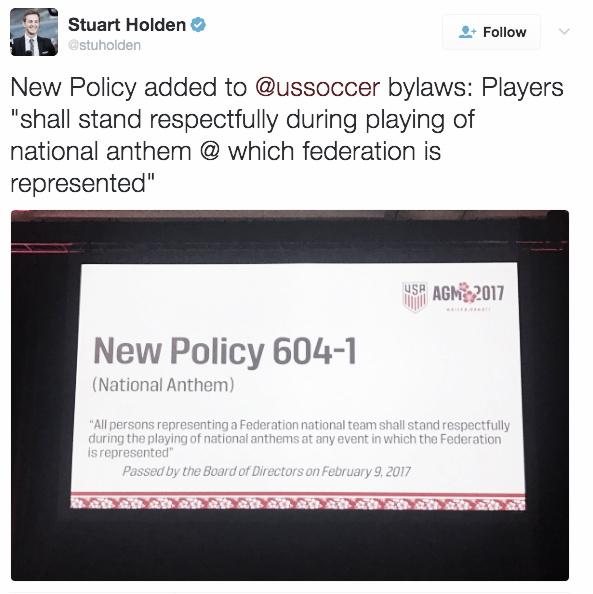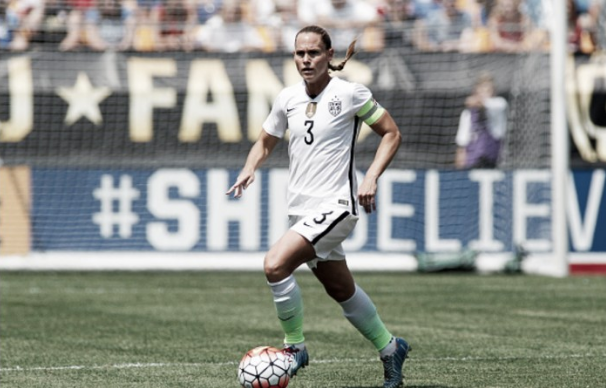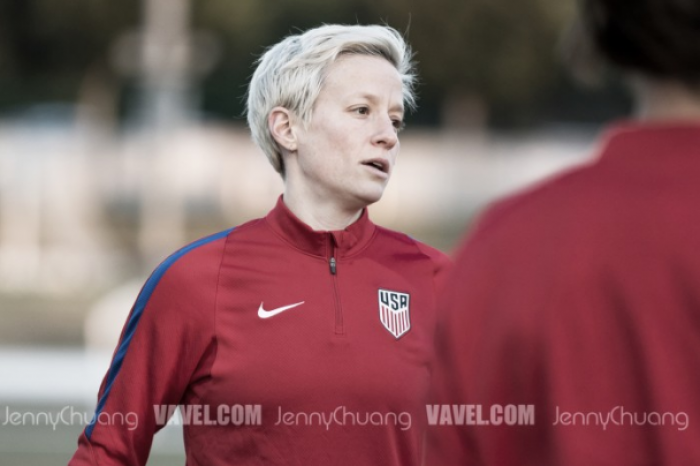On September 4th, 2016, US Women’s National Team star Megan Rapinoe knelt during the playing of the national anthem before the Seattle Reign, her club squad, took the pitch against the Chicago Red Stars. Taking a cue from NFL quarterback Colin Kaepernick’s peaceful protest against racial inequality in America, she faced a lot of conjecture as to whether or not she would continue that protest whilst wearing the jersey of the USWNT. On September 15th, before a USWNT friendly vs Thailand in Columbus, Ohio, she did just that.
The U.S. Soccer Federation quickly condemned her actions, saying ‘as part of the privilege to represent your country, we have an expectation that our players and coaches will stand and honor our flag while the national anthem is played’. Past that statement, the federation took no further action against Rapinoe, though she has found herself on the outside looking in when it comes to the current USWNT roster due to her current fitness and form.
Today, however, that changed. US Soccer announced a new policy, passed by its Board of Directors on February 9th, regarding player behavior during the playing of the USA anthem before every international match, entitled New Policy 604-1 (National Anthem). The policy states that “All persons representing a Federation national team shall stand respectfully during the playing of national anthems at any event in which the Federation is represented.” And while this policy technically change applies to all forms of the US National Team, and one can’t argue the federations right to set rules for player conduct while in the organizations employment, the change can only be read as a targeted, unmeasured response specifically towards the position and freedoms of the women’s team.

No action exists in a vacuum
First, some context. Since January 1st, 2017, the USWNT has been without an official collective bargaining agreement with the US Federation, throwing into doubt the players’ contracts with their NWSL teams, as well as their standing within the current USWNT structure. The players have been very careful to continue to push for higher salaries and greater consideration when it comes to conditions, marketing and sponsorship through their ‘Equal Play, Equal Pay' campaign, while still working with the federation as the team moves forward competitively.
While the team is committed to maintaining their professionalism and quality as the world’s best squad on the field, they’ve also been tasked with the herculean task of coaxing a federation that unfairly allots time and resources towards the men’s squad to see them merely as equals to their counterparts. And however the women’s squad might have tried to maintain this difficult balance, the cracks of this tenuous relationship had already begun to show before this action against peaceful protest was put into place, and the context of that relationship simply can’t be ignored.
This also throws into further question the nature of US Soccer’s stance on politicization in general. If the federation is trying to portray a balanced view on all controversy, why was no mention made of Tim Howard’s comments in January stating that foreign born players ‘lose sight of what you’re all about’, or his frustration that the post-game ceremony for the 2011 Gold Cup was in Spanish, a language that was not only the native tongue of the winner of the cup, Mexico, but is a language that more than 37 million United States citizens speak.
This imbalance could come from US Soccer’s preference as to which political opinion with which they find most comfortable to align, or from a difference in culpability for the men and women’s side, but the cherry picking of causes that the federation feels comfortable silencing, particularly in this greater national environment of exclusion and fear, is deeply discouraging.
Terms remain vague, frustrating
Additionally, if US Soccer’s intention was to provide clarity to their stance on peaceful protest, or to assuage growing pressure from outside sponsors, they’ve failed on both counts. The updated policy provides no insight as to what the punishment for continuing to kneel during the anthem would be, giving full discretion to US Soccer on a case-by-case basis. This leaves players with no deeper understanding as to how severely the organization would view such resistance, and what they might be putting on the line in order to peacefully express their beliefs.
And while a general argument about placing the priorities of sponsors over the well-being of your players can be muddied by personal philosophy on the matter, the truth when it comes to the Women’s National Team specifically is that this policy turns into another bargaining chip US Soccer can hold over the heads of the squad as they continue with their CBA negotiations. It’s hard to see how a sponsor's opinion over an issue brought to light by Rapinoe would be of equal importance to both the federation and the USWNT itself, considering the SheBelieves Cup has just entered into its second year without an official sponsor.

Why right now?
The timing of this action also feels specifically pointed at the women’s side of the organization, considering it dropped around 2:45 pm today, less than 2 hours before the USWNT is set to kick off against England in their second game of the SheBelieves tourney, arguably their highest profile event of the year. The full US Men’s side isn’t even currently in camp. To add insult to injury, this game was set aside to honor Christie Rampone, a USWNT veteran of 20 years who captained the team to their third World Cup title in 2015. It merely furthers the message that US Soccer is consistently comfortable championing certain voices while silencing others, and distracting from (to the point of self-sabotage) everything the US Women’s National Team has worked so hard to achieve, both on and off the field.





































